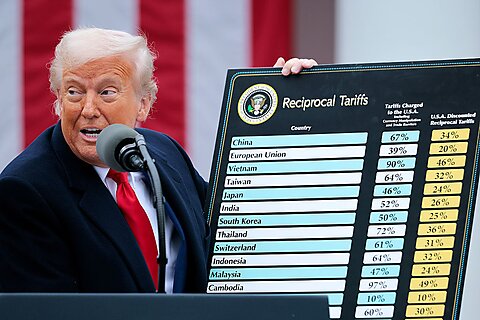Thomas A. Berry, Brent Skorup, and Charles Brandt
Shortly after taking office, President Trump issued a series of executive orders imposing new duties on imports from dozens of countries, resulting in rapid increases and (partial) decreases in tariff rates, from 10 to 145 percent. The president claims the tariffs are necessary to combat illegal drug trafficking and trade imbalances, both of which he has declared “national emergencies.” Therefore, he relied on the International Emergency Economic Powers Act of 1977 (IEEPA) to impose tariffs on nearly every US trading partner.
The IEEPA gives the president broad powers to block transactions between Americans and foreign citizens when responding to an “unusual and extraordinary threat.” And for decades, presidents have used this law to impose economic sanctions on nations or individuals. But this is the first time a president has imposed tariffs under the IEEPA.
The new tariffs have imposed large costs on many owners of American businesses. A group of states and small businesses, including VOS Selections, Inc.—a family-owned wine and spirits company—sued the president in the US Court of International Trade (CIT), to block the tariffs. They argued that setting duties exceeded the president’s legal authority under IEEPA and violated the Constitution.
The CIT agreed with VOS Selections and permanently enjoined the tariffs. Now, the administration has appealed to the Federal Circuit Court of Appeals. Cato has filed an amicus brief in support of VOS Selections.
In our brief, we provide historical context about Congress’s constitutional role in tariff policy and the IEEPA’s original purpose. Under recent Supreme Court precedent, Loper Bright v. Raimondo (2024), courts must independently determine the best reading of a statute and not automatically defer to the executive’s interpretation. We highlight several problems with the administration’s position.
First, Article I, Section 8 of the Constitution vests the power to impose tariffs solely in Congress. For more than a century, Congress set tariff rates directly, even in times of war and national crisis. The reason for this longstanding practice is clear: Congress cannot vest duty-setting power—a legislative power—with the president, just as Congress cannot vest judicial power with the president or the Speaker of the House.
Second, the IEEPA’s text provides no support for the president’s tariff authority. When Congress has delegated some tariff authority to the president, it has done so clearly and explicitly, as in the Trade Expansion Act of 1962 and the Trade Act of 1974. The IEEPA is different. It makes no mention of “tariffs” or “duties,” and no president has used it to impose tariffs in the nearly 50 years since it became law—until now.
Finally, the government’s position runs contrary to IEEPA’s purpose. Congress passed the IEEPA to limit executive power during emergencies. Even President Franklin Roosevelt—who had an expansive theory of presidential power and was president during an economic depression and a global war—never used IEEPA’s more powerful predecessor, the Trading with the Enemy Act, to modify tariffs.
It is thus ironic—and legally untenable—for a president to invoke IEEPA for tariff-setting authority that no president has ever exercised. The Court should reject the government’s position, affirm the CIT’s decision, and block the imposition of these tariffs.

